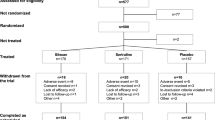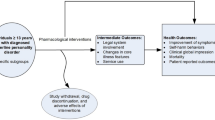Abstract
Limited research is available regarding the efficacy of psychostimulants in treating cognitive function in primary brain tumor patients. An open-label, randomized, pilot trial examined both the general and differential efficacy of 4 weeks of methylphenidate (MPH) and modafinil (MOD) in 24 brain tumor patients. Participants completed cognitive tests and self-report measures of fatigue, sleep disturbance, mood and quality of life at baseline and after 4 weeks.
Following stimulant treatment, there was evidence of a beneficial effect on test performance in speed of processing and executive function requiring divided attention. Patients with the greatest deficit in executive function at baseline appeared to derive the greatest benefit following stimulant therapy. Inconsistent, differential effects were found on a measure of attention in favor of MPH and on a measure of processing speed in favor of MOD. There was also evidence of a general beneficial effect on patient-reported measures of fatigue, mood, and quality of life, with no statistically significant differences between treatment arms in these measures over time. The results from this small pilot study should be interpreted with caution, but appear to warrant additional research, in larger study samples, targeting fatigue, processing speed and executive function, and exploring different doses of stimulants. Future studies may also wish to explore the specific patient factors that may be associated with responsiveness to psychostimulant treatment.
Similar content being viewed by others
References
Taphoorn MJ, Klein M (2004) Cognitive deficits in adult patients with brain tumours. Lancet Neurol 3:159–168
Gehring K, Aaronson NK, Taphoorn MJ, Sitskoorn MM (2010) Interventions for cognitive deficits in patients with a brain tumor: an update. Exp Rev Anticancer Ther 10:1779–1795. doi:10.1586/era.10.163
Volkow ND, Fowler JS, Wang G, Ding Y, Gatley SJ (2002) Mechanism of action of methylphenidate: insights from PET imaging studies. J Atten Disord 6(Suppl 1):S31–S43
Hannestad J, Gallezot JD, Planeta-Wilson B, Lin SF, Williams WA, van Dyck CH, Malison RT, Carson RE, Ding YS (2010) Clinically relevant doses of methylphenidate significantly occupy norepinephrine transporters in humans in vivo. Biol Psych 68:854–860. doi:10.1016/j.biopsych.2010.06.017
Berridge CW, Devilbiss DM (2011) Psychostimulants as cognitive enhancers: the prefrontal cortex, catecholamines, and attention-deficit/hyperactivity disorder. Biol Psychiatry 69:e101–e111. 10.1016/j.biopsych.2010.06.023
Auriel E, Hausdorff JM, Giladi N (2009) Methylphenidate for the treatment of Parkinson disease and other neurological disorders. Clin Neuropharmacol 32:75–81. doi:10.1097/WNF.0B013E318170576C
Siddall OM (2005) Use of methylphenidate in traumatic brain injury. Ann Pharmacother 39:1309–1313. doi:10.1345/aph.1E637
Repantis D, Schlattmann P, Laisney O, Heuser I (2010) Modafinil and methylphenidate for neuroenhancement in healthy individuals: a systematic review. Pharmacol Res 62:187–206. doi:10.1016/j.phrs.2010.04.002
Volkow ND, Fowler JS, Logan J, Alexoff D, Zhu W, Telang F, Wang GJ, Jayne M, Hooker JM, Wong C, Hubbard B, Carter P, Warner D, King P, Shea C, Xu Y, Muench L, Apelskog-Torres K (2009) Effects of modafinil on dopamine and dopamine transporters in the male human brain: clinical implications. JAMA 301:1148–1154. doi:10.1001/jama.2009.351
Turner DC, Robbins TW, Clark L, Aron AR, Dowson J, Sahakian BJ (2003) Cognitive enhancing effects of modafinil in healthy volunteers. Psychopharmacol (Berl) 165:260–269. doi:10.1007/s00213-002-1250-8
Muller U, Steffenhagen N, Regenthal R, Bublak P (2004) Effects of modafinil on working memory processes in humans. Psychopharmacol (Berl) 177:161–169. doi:10.1007/s00213-004-1926-3
Walsh JK, Randazzo AC, Stone KL, Schweitzer PK (2004) Modafinil improves alertness, vigilance, and executive function during simulated night shifts. Sleep 27:434–439
Young JW, Geyer MA (2010) Action of modafinil–increased motivation via the dopamine transporter inhibition and D1 receptors? Biol Psychiatry 67:784–787. doi:10.1016/j.biopsych.2009.12.015
Minzenberg MJ, Watrous AJ, Yoon JH, Ursu S, Carter CS (2008) Modafinil shifts human locus coeruleus to low-tonic, high-phasic activity during functional MRI. Science 322:1700–1702. doi:10.1126/science.1164908
Brown JN, Howard CA, Kemp DW (2010) Modafinil for the treatment of multiple sclerosis-related fatigue. Ann Pharmacother 44:1098–1103. doi:10.1345/aph.1M705
Cooper MR, Bird HM, Steinberg M (2009) Efficacy and safety of modafinil in the treatment of cancer-related fatigue. Ann Pharmacother 43:721–725. doi:10.1345/aph.1L532
Weitzner MA, Meyers CA, Valentine AD (1995) Methylphenidate in the treatment of neurobehavioral slowing associated with cancer and cancer treatment. J Neuropsyc Clin Neurosci 7:347–350
Meyers CA, Weitzner MA, Valentine AD, Levin VA (1998) Methylphenidate therapy improves cognition, mood, and function of brain tumor patients. J Clin Oncol 16:2522–2527
Kaleita TA, Wellisch DK, Graham CA, Steh B, Nghiemphu P, Ford JM, Lai A, Peak S, Cloughesy TF (2006) Pilot study of modafinil for treatment of neurobehavioral dysfunction and fatigue in adult patients with brain tumors. J Clin Oncol 24:1503
Butler JM Jr, Case LD, Atkins J, Frizzell B, Sanders G, Griffin P, Lesser G, McMullen K, McQuellon R, Naughton M, Rapp S, Stieber V, Shaw EG (2007) A phase III, double-blind, placebo-controlled prospective randomized clinical trial of d-threo-methylphenidate HCl in brain tumor patients receiving radiation therapy. Int J Radiat Oncol Biol Phys 69:1496–1501
Minton O, Richardson A, Sharpe M, Hotopf M, Stone PC (2011) Psychostimulants for the management of cancer-related fatigue: a systematic review and meta-analysis. J Pain Symptom Manage 41:761–767. doi:10.1016/j.jpainsymman.2010.06.020
Portela MA, Rubiales AS, Centeno C (2011) The use of psychostimulants in cancer patients. Curr Opin Support Palliat Care 5:164–168. doi:10.1097/SPC.0b013e3283462ff3
Lasheen W, Walsh D, Mahmoud F, Davis MP, Rivera N, Khoshknabi DS (2010) Methylphenidate side effects in advanced cancer: a retrospective analysis. Am J Hosp Palliat Care 27:16–23. doi:10.1177/1049909109345145
Fernandez F, Adams F (1986) Methylphenidate treatment of patients with head and neck cancer. Head Neck surg 8:296–300
Bruera E, Miller MJ, Macmillan K, Kuehn N (1992) Neuropsychological effects of methylphenidate in patients receiving a continuous infusion of narcotics for cancer pain. Pain 48:163–166
Gagnon B, Low G, Schreier G (2005) Methylphenidate hydrochloride improves cognitive function in patients with advanced cancer and hypoactive delirium: a prospective clinical study. J psychiatry Neurosci 30:100–107
Mar Fan HG, Clemons M, Xu W, Chemerynsky I, Breunis H, Braganza S, Tannock IF (2008) A randomised, placebo-controlled, double-blind trial of the effects of d-methylphenidate on fatigue and cognitive dysfunction in women undergoing adjuvant chemotherapy for breast cancer. Support Care Cancer 16:577–583. doi:10.1007/s00520-007-0341-9
Kohli S, Fisher SG, Tra Y, Adams MJ, Mapstone ME, Wesnes KA, Roscoe JA, Morrow GR (2009) The effect of modafinil on cognitive function in breast cancer survivors. Cancer 115:2605–2616. doi:10.1002/cncr.24287
Lundorff LE, Jonsson BH, Sjogren P (2009) Modafinil for attentional and psychomotor dysfunction in advanced cancer: a double-blind, randomised, cross-over trial. Palliat Med 23:731–738. doi:10.1177/0269216309106872
Blackhall L, Petroni G, Shu J, Baum L, Farace E (2009) A pilot study evaluating the safety and efficacy of modafinal for cancer-related fatigue. J Palliat Med 12:433–439. doi:10.1089/jpm.2008.0230
Chelune GJ, Naugle RI, Luders H, Sedlak J, Awad IA (1993) Individual change after epilepsy surgery: practice effects and base-rate information. Neuropsychology 7:41–52
Wechsler D (1997) Wechsler adult intelligence scale III. Psychological Corporation, San Antonio
Benedict RH, Zgaljardic DJ (1998) Practice effects during repeated administrations of memory tests with and without alternate forms. J Clin Exp Neuropsychol 20:339–352
Ruff R, Light R, Parker S (1996) Visuospatial learning: ruff light trail learning test. Arch Clin Neuropsychol 11:313–327
Levine AJ, Miller EN, Becker JT, Selnes OA, Cohen BA (2004) Normative data for determining significance of test-retest differences on eight common neuropsychological instruments. Clin Neuropsychol 18:373–384
Norman GR, Sloan JA, Wyrwich KW (2003) Interpretation of changes in health-related quality of life: the remarkable universality of half a standard deviation. Med Care 41:582–592. doi:10.1097/01.MLR.0000062554.74615.4C
Randall DC, Shneerson JM, File SE (2005) Cognitive effects of modafinil in student volunteers may depend on IQ. Pharmacol Biochem Behav 82:133–139. doi:10.1016/j.pbb.2005.07.019
Finke K, Dodds CM, Bublak P, Regenthal R, Baumann F, Manly T, Muller U (2011) Effects of modafinil and methylphenidate on visual attention capacity: a TVA-based study. Psychopharmacol (Berl) 210:317–329. doi:10.1007/s00213-010-1823-x
Author information
Authors and Affiliations
Corresponding author
Rights and permissions
About this article
Cite this article
Gehring, K., Patwardhan, S.Y., Collins, R. et al. A randomized trial on the efficacy of methylphenidate and modafinil for improving cognitive functioning and symptoms in patients with a primary brain tumor. J Neurooncol 107, 165–174 (2012). https://doi.org/10.1007/s11060-011-0723-1
Received:
Accepted:
Published:
Issue Date:
DOI: https://doi.org/10.1007/s11060-011-0723-1




